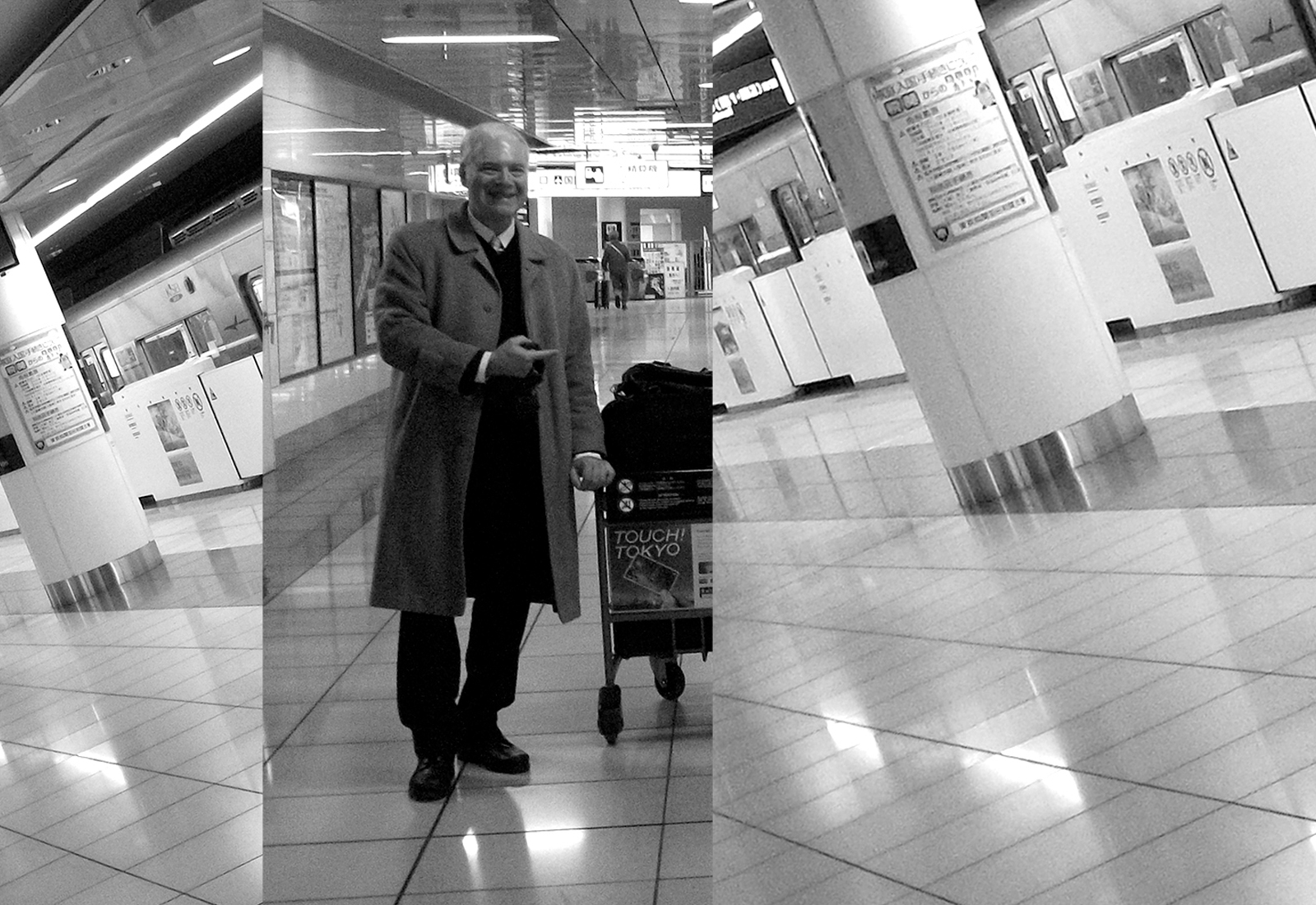
A secret confidence to Philip’s friends
In a wondering action between a festival and a conference, the news dropped that someone could be arriving. A reference, but especially someone with a space that seemed to be able to come closer.
We shared a vague history built among the corridors that, for several years, we covered together, amidst different interests, projects unknown to each other, brief greetings in biased language systems ... we came and went and time passed.
We were unaware that, in the meantime, a mission had ended and new horizons were now busying those eye exchanges and quick smiles of those who, in different worlds, acknowledged themselves as voracious people in ongoing projects.
In America, his distant land, an invasion made it difficult to extend the wave. The news about a war that had been caused enabled us to know that people paid through their noses in a useless measure.
Unique stories of men, their ways of shaping their privacy, building noticeable approaches in a wealthy manner and indecipherable at the eyes of others, living monuments that were decades old. Each one times many, so many that they would quickly surpass the countless space of thousands and then millions. A humongous library of a deep and organic space was being turned into dust. Just any five-centimetre bullet (maybe less...) wiped everything out.
Around there, our defenses fell and one embarked on a spirit that unwillingly would almost become warrior-like.
It was an invading America that thus was giving out (as all invaders) hero safe-conducts to those who prematurely were only playing the obvious role of murderers.
We had and still have grasped the concept of the importance of life as a sublime herald of the polar star in each story built. We were hoarding years of what has always been the matter of our “progress ladder step by step”.
At that time, we recalled a teacher’s maxim, from one of our teachers from elsewhere in the world who used to say that "men are all the same, the problem is when some think they are more than others or when they think they are less than others".
Times were constantly changing, we knew they were special but we thought they were also unique and capable of representing a turning point, as if the explosion of barbarity did not take place in the supposedly contemporary times. We sought in the present for the signs we thought would be clear of a temporal latency cemented in the almost prosaic wisdom of history, in the multiple worldwide investment in education, science and art.
Vain credit to the world, at which time nothing seems to reach.
That someone arrived.
Other invasions had happened (not all from this person’s country) and, in the meantime, thousands of heroes ended up fallen and the crossfire of small or large bullets devastated further “houses of built spirits”. Time shaped new hopes in us, where others just occupied more and more empty palaces.
A Santa Claus certified by the organizations from Uncle Sam’s land may have been the first convergence node for a meeting that was announced, that was promised among conversations and meetings that followed. We were all getting ready for the arrival of summer, hot conversations could be predicted, possibilities could be announced. Maria Nina was now the messenger of all perspectives, the eloquence surprise whose source we had suspected and after could be confirmed.
The meeting was exemplary. Among charming smiles, the impressive body of a man who could also have the build of a Santa Claus, the first steps for long and serene conversations were taken, for constant questions almost shredding each idea – closing in scattered paths and replacing them for mapping choices – or for eminently, or better still, supposedly lit paths.
The AVANCA | CINEMA 2011 Conference was thus the place for the first real meeting. It was also and, above all, the first blow for an outsider, with a striking and new environment when compared to what was generally taking place in scientific conferences from hypothetically all walks of life.
There, among several walls assembling multiple places, nature beds where rest and confidence pair up with the relevance of reflections and with the discovery of new communication, there was the place for successive small gatherings.
In these successive ends of July, summer is at this scorching hot peak, which prowls around every conversation, and the high sun appears to pour light so as to undress everything. It is probably this almost pristine blend of permanently open contexts that, moving around almost non-stop, has enabled us to find this new visitor in an everlasting dialogue.
We discovered in him meticulous attention, a concern for the other, for other people’s things, the goals, perspectives, wishes that arrived from almost everyone and there, in him, found a safe haven where all was tied up before setting out for a new journey.
Philip P. Zitowitz
A great man had just invaded Avanca.
Among films, presentations and especially among the people who, around those days, dived into the cinema of an open-armed Avanca, Philip was the American from the coast of all continents, magnanimously present.Embedded in the spirit, the new projects seemed to daily pair up with the voracious presence of film works, the multi spaces talks, the learning / production contributions, and everything that can characterize a festival / conference around cinema. Lengthy experience in the field of scientific research soared around there, as well as intensive academic experience, a passion for cinephilia, significant and remarkable openness to new media, but also enhanced understanding through the search of experimentation and new aims.
Integrating the academic jury for the Engineer Fernando Gonçalves Lavrador Prize (which is an added reason for the most legitimate tribute to one of the most charismatic and singular researchers in the critical, aesthetic and comprehensive field of cinema and of Portuguese cinema), he mediated the processes for distinguishing more than one thousand and a few hundred pages that represent the “photomation” of the conference, the projects, the research and all that induces conference debates. A harsh task that reached a remarkable conclusion through an almost delicate involvement, in which each part of the juries seemed invariably to be whole. Bringing together, participating, debating, supporting all the queries, scrutinizing different paths, all these might have been some of his conclusive contributions to the AVANCA project.
AVANCA was thus an unexpected spearhead in a West which remained far away from his new university. Between the towers that give architectural volume to the University Meiji in the center of Tokyo, Philip developed an extensive academic activity in which movies were increasingly being included.
As a result, Cosmo Fest is naturally born at the end of 2012, collecting movies from Avanca, but also from other places, and marks a territory that would be crucial: the bridges for continuous search and complementation between the West and the East.
With a strong participation from his students, this project would influence the following resourcefulness and forge new connections. This wide scope seemed to be carried on with each new step. The connections led him to Cannes, Venice, Busan, but also India, Kenya, and Iran. From Japan, the drawn lines multiplied continental routes that sustained diverse views and cultures in a constant search for intertwining. Nearby, the trips to Korea were intensified and this delicious and almost “omni” presence brought added value, which flourished and were pinpointed in different continents. Actions, projections and communication dealt a card in which friendship was immeasurably strengthening. Friendship seemed to be another awkward territory... After all, what are we supposed to do in our short lives without the engaging warmth of friendship? Very little would surely remain from this absence and it would always be a huge barren space that, we dare to say, would have very little meaning for structuring his personality.
In the volatile presence of whispers that constantly foresee dreams, the yearning for a new space was spilled over, a space where paper can hold hands with movies and their spaces. The paper would be a “leitmotiv” for what was actually building the cloud for this new project – research, academia, cinephilia, new irreverence between films and everything else, the approach to these worlds that together seemed undeniably distant. Suddenly, it looked as if the academy had to be forced to dance without harnesses, to surrender to the wheel of all motives, to present living spaces that appeared to insist on not participating in life. Perhaps the feeling of responsibility had suddenly fallen upon us ... after all, our first refuge was the academy.
Throughout the channels for dissemination and debate that research was coming across, it all seemed far too serious in a way that it was as if it might be failing its mission. Restricting to the branch of one approach, staying away from other contexts, specifying and narrowing down to the word and to the numbers, something cinema insists on leaving to the following stage, this appeared to be the lever for another approach, for a far too pungent challenge that could not possibly be taken seriously.
The “International Journal of Cinema” is born out of these reflections, but especially among the thousand conversations that savourily Philip was crisscrossing in a multiplying map, masterly and sufficiently round to conciliate all the summaries in a scattered field of the future.
The form was putting on clothing and the content was being shaped in a mutual embrace. Ideas, goals, decisions, methodologies, desires, ambitions, findings and the shock of growth were gaining ground here.
But the press seems to have created the thousand different film screens in the final measure of the projection on a large 70mm widescreen. The almost pungent desire of immersion and, on the other hand, the spectral film multiplication, appeared thus to reflect the volume of the first issue.
It was born wrapped in four simetrical sides and with enough size to receive an enormous plane ... almost.
A second issue would soon occupy the horizon that seemed immediate. Philip found through the geography of Finland someone who could truly give it a body.
Dr. Kaisu Koski and Dr. Pia Tikka became the first invited publishers of this publishing project.
“Cinema and the body” thus integrates a space of an almost unexpected, insurmountable and untranslatable partnership. Where research finds its port, it is exactly there that the fundamental “body” is missing.
Suddenly, disappearing among disbelief and a finite awareness, Philip can no longer be with us at the time when the first pages of this issue may see the light of day.
The lengthy printing time will not disguise the shock of the absence and will not underestimate the importance of a hallmark that the bliss of the future may bring to each new issue. At each new issue of “International Journal of Cinema”, he will be there and in the edition, underlying:
Philip D. Zitowitz (1943-2014)
This is the only, ultimate and secret confidence that these pages may still offer everyone and PHILIP’s friends. Perhaps along with a bear hug, in a huge body, where each retro look / memory is always a formidable airport.
Antonio Costa Valente and the whole team of the “International Journal of Cinema”
Uma sigilosa confidência aos amigos de Philip
Na ação errante entre um festival e uma conferência, caiu por ali a notícia de alguém que poderia chegar. Uma referência, mas sobretudo alguém com um espaço que parecia se poder aproximar.
Tínhamos um vago histórico construído entre corredores que vários anos atrás foram mutuamente corridos entre interesses diversos, projetos reciprocamente desconhecidos, breves cumprimentos em dúbios sistemas de linguagem... passávamos e o tempo passou.
Desconhecíamos que entretanto uma missão tinha findado e novos horizontes ocupavam agora aqueles olhos de cruzamentos e rápidos sorrisos de quem em mundos diferentes se sabiam vorazes em contínuos projetos.
Na América, a sua longínqua terra, uma invasão tornava difícil um aceno mais prolongado. As notícias de uma guerra provocada faziam-nos saber que povos pagavam inutilmente soberbas alheias.
Histórias únicas de homens, das suas formas de moldar a sua privacidade, construção de aproximações únicas com um modo rico e indecifrável a outros olhos, monumentos de vida de décadas. Cada um multiplicado por muitos, tantos que, rapidamente ultrapassaram o espaço incontável dos milhares e depois milhões. Uma imensa biblioteca de profundo e orgânico espaço estava a ser volatilizada. Uns quaisquer cinco centímetros de bala (talvez menos...) extinguiam tudo.
Por ali, caiam as nossas defesas e embarcava-se num espírito que contra vontade quase se tornava guerreiro.
Era uma América invasora que por isso distribuía (como todos os invasores) salvacondutos de heróis aos que emberbemente faziam unicamente o papel óbvio de assassinos.
Tínhamos e temos o conceito agarrado da importância da vida enquanto sublime arauto da estrela polar de cada história construída. Acumulávamos anos do que sempre constituiu a matéria da nossa “escada de avanço lanço a lanço”.
Por esse tempo recordámos uma máxima de um professor, de um nosso professor que de outras paragens do planeta dizia que “os homens são todos iguais, o problema é quando alguns pensam que são mais do que outros ou quando pensam que são menos que os outros”.
Os tempos estavam em permanente mutação, sabiamo-los especiais mas julgávamos serem únicos, serem capazes de marcarem uma viragem. Como se a explosão da barbárie não se consumasse aos tempos supostamente contemporâneos. Procurávamos no presente os sinais que julgávamos inequívocos de uma latência temporal cimentada na quase prosaica sabedoria da história, na múltipla aposta planetária na educação, na ciência e na arte.
Vã crédito a mundo, a cujo tempo parece nada chegar.
O alguém chegou.
Tinham acontecido outras invasões (nem todas do país deste alguém), milhares de heróis acabaram entretanto tombados e o cruzar de pequenas ou grandes balas devastaram ainda mais “casas dos espíritos construídos”. O tempo moldou-nos outras esperanças onde as outras se limitaram a ocupar mais e mais palácios vazios.
Um Pai Natal certificado pelas organizações da terra do Tio Sam terá sido o primeiro nódulo de convergência de um encontro que se anunciou, que se prometeu entre conversas e encontros seguintes. Preparava-se a chegada do Verão, vaticinavam-se quentes conversas, anunciavam-se possibilidades. Maria Nina era agora a mensageira de todas as perspectivas, a surpresa da eloquência de que adivinhámos e depois confirmámos a origem.
O encontro foi modelar. Entre expressivos sorrisos, a imponência física de um homem que também ele poderia ter a envergadura de um Pai Natal, iniciaram-se os primeiros passos de longas e serenas conversas, de constantes perguntas a quase dilacerarem cada ideia, a fecharem caminhos dispersos substituindo-os por um mapear de escolhas, de caminhos eminentemente ou melhor ainda, supostamente iluminados.
A Conferência AVANCA | CINEMA 2011 foi assim o espaço do verdadeiramente primeiro encontro. Foi também e sobretudo o primeiro embate para um forasteiro, com uma ambiência marcante e nova, para o que em geral se ia encontrando nas conferências científicas de hipoteticamente todas as outras paragens.
Ali, entre paredes diversas edificando recantos múltiplos, canteiros de natureza onde o descanso e a confidência encontram pares na pertinência das reflexões e na descoberta de uma nova comunicação, sucederam-se pequenos encontros.
O Verão, nestes sucessivos finais de julho, tem por aqui um pino de calor a rondar cada conversa e um pino de sol que parece verter luz para tudo despir. Será esta quase pura integração de contextos, permanentemente abertos, que circulando quase que em contínuo, nos tenha feito encontrar este novo visitante em permanente diálogo.
Descobrimos-lhe uma intensa atenção, uma preocupação pelo outro, pelas coisas do outro, pelas metas, perspectivas, desejos que chegavam de quase todos e ali, nele encontravam um porto seguro onde tudo amarrava antes de seguir nova viagem.
Philip P. Zitowitz
Um homem grande tinha acabado de invadir Avanca.
Por entre os filmes, as comunicações e sobretudo por entre as pessoas que por estes dias mergulham no cinema de um Avanca disponível, Philip era o Americano do costado de todos os continentes, magnanimamente presente.
Mergulhado no espírito, os novos projetos pareciam acompanhar diariamente a voraz presença das obras filmicas, das palestras em multi espaços, das contribuições formação / produção, de tudo o que pode caraterizar um festival / conferência à volta do cinema. Por ali pairava uma longa experiência no âmbito da investigação científica, uma longa vivência académica, uma paixão cinéfila, uma significativa e marcante abertura aos novos media, mas igualmente uma vivência na procura da experimentação e de novas metas.
Integrando o júri académico do Prémio Eng. Fernando Gonçalves Lavrador (por onde passa uma justíssima homenagem a um dos mais carismáticos e singulares investigadores da causa crítica, estética e compreensiva do cinema e do cinema português), mediou processos de distinção entre as mais de um milhar e algumas centenas de páginas que fazem o “photomation” da conferência, dos projetos, da investigação, do que move os debates da conferência. Difícil tarefa a que um quase delicado envolvimento deu notória conclusão, onde cada parte de cada júri sempre pareceu ver-se una. Juntar, participar, debater, sufragar todas as interrogações, perscrutar caminhos, terão sido também estas algumas das suas conclusivas participações no projeto AVANCA.
AVANCA era assim uma inesperada ponta de lança num ocidente sempre longe da sua nova universidade. Entre as torres que no centro de Tóquio dão volume arquitectónico à Universidade Meiji, Philip desenvolvia uma extensa atividade académica por onde cada vez mais os filmes iam passando.
Cosmo Fest nasce assim naturalmente no final de 2012, agrupando filmes de Avanca mas também de outras paragens e marca um território que viria a ser crucial: as pontes em contínua procura/complemento entre o ocidente e o oriente.
Com uma forte participação dos seus alunos, este projeto marcaria desenvoltura seguinte e cimentaria novas ligações. A abrangência parecia continuar a marcar cada novo passo. As ligações levaram-no a Cannes, a Veneza, a Busan, mas também à Índia, ao Quénia, ao Irão. Do Japão as linhas traçadas multiplicaram percursos continentais sufragando visões e culturas diversas numa permanente procura de junção. Por perto, as viagens à Coreia intensificam-se e esta suculenta presença quase “omni” traz valor que se propaga e identifica em continentes diferentes. Ações, projeções, comunicações, marcam uma carta de onde o estreitar de amizades nunca se afasta. A amizade parece ser um outro território insolúvel... afinal que fazer na curta vida de cada um sem o calor motivador da amizade? Certamente que restaria dessa ausência muito pouco e seria sempre um imenso espaço árido, que arriscamos dizer, com muito pouco significado estruturante da sua personalidade.
Na volátil presença dos sussurros que sempre preconizam sonhos, espraiou-se a vontade de um novo espaço onde o papel pode-se dar companhia aos filmes e aos seus espaços. O papel seria um “leit-motiv” para o que realmente estava a construir a nuvem deste novo projeto – a investigação, a academia, a cinefilia, as novas irreverências entre o filme e tudo o resto, a aproximação destes mundos que juntos pareciam terminantemente distantes. De repente, parecia que se tinha que obrigar a academia a dançar sem freio, a render-se à roda de todas as motivações, a mostrar espaços de vida que parecem teimar em nela não participar. Talvez a obrigação tivesse caído subitamente sobre nós... afinal tínhamos na academia o nosso primeiro refúgio.
Por onde a investigação ia encontrando canais de divulgação e debate, tudo parecia demasiado sério que pareceu poder estar a incumprir a sua missão. Ficar no ramo de uma abordagem, afastando outros contextos, especificando e afunilando à palavra e aos números o que o cinema teima a deixar no plano seguinte, parecia ser a alavanca para uma outra abordagem, para um desafio demasiado pungente que não pudesse ser levado a sério.
O “International Journal of Cinema” nasce por entre estas reflexões, mas sobretudo por entre as mil conversas que saborosamente Philip ia entrecruzando num mapa multiplicador magistralmente e suficientemente redondo para conciliar todos os resumos num disperso campo de futuro.
A forma foi ganhando roupagem e o conteúdo moldando-se num abraço mútuo. Por aqui foram ficando ideias, objetivos, decisões, metodologias, desejos, ambições, constatações e o choque do crescimento.
Mas o prelo parece ter criado os mil diferenciados ecrãs filmicos na medida final da projeção de um largo ecrã panorâmico de 70 mm. O quase pungente desejo da imersão e, por outro lado, da multiplicação filmico espectral, parecia refletir-se assim na volumetria do primeiro número.
Tinha nascido envolto em 4 lados milimetricamente iguais e com a dimensão para poder receber um enorme avião... quase.
Um segundo número vinha rapidamente a ocupar um horizonte que parecia imediato. Philip encontrara pela geografia da Finlândia alguém que lhe poderia dar verdadeiramente corpo.
Dr. Kaisu Koski e Dr. Pia Tikka transformaram-se nas primeiras editoras convidadas deste projeto editorial.
“O cinema e o corpo” integra assim um espaço de quase e inesperada intransponível e intraduzível parceria. Onde a investigação encontra o seu porto, é exatamente aí que falta o “corpo” fundamental.
Subitamente, sumido entre incredulidade e a constatação finita, Philip já não poderá acompanhar-nos na hora em que as primeiras páginas deste número possam apanhar a luz do seu primeiro sol.
O longo tempo do prelo não disfarçará o choque da ausência e não subestimará a importância de uma marca que a ventura do tempo futuro possa trazer em cada novo número. Por cada novo “International Journal of Cinema” estará por ali e na edição, a latência:
Philip D. Zitowitz (1943-2014)
Esta é a única, derradeira e sigilosa confidência que a todos e aos amigos de PHILIP estas páginas ainda podem deixar. Talvez acompanhado de um enorme abraço, num corpo enorme, onde cada retro olhar / memória é sempre um formidável aeroporto.
António Costa Valente e toda a equipa do “International Journal of Cinema”
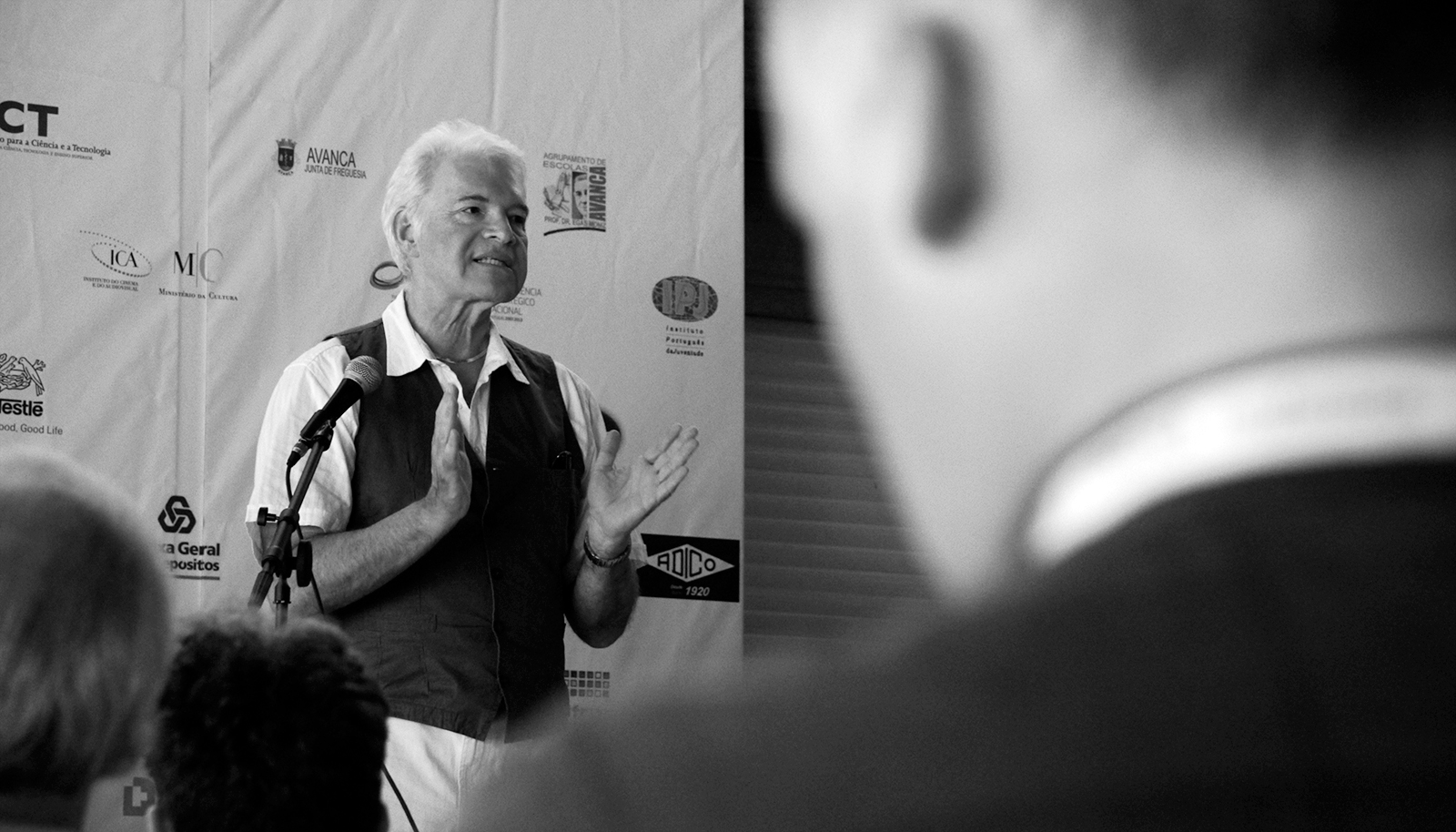
HOMENAGEM | TRIBUTE
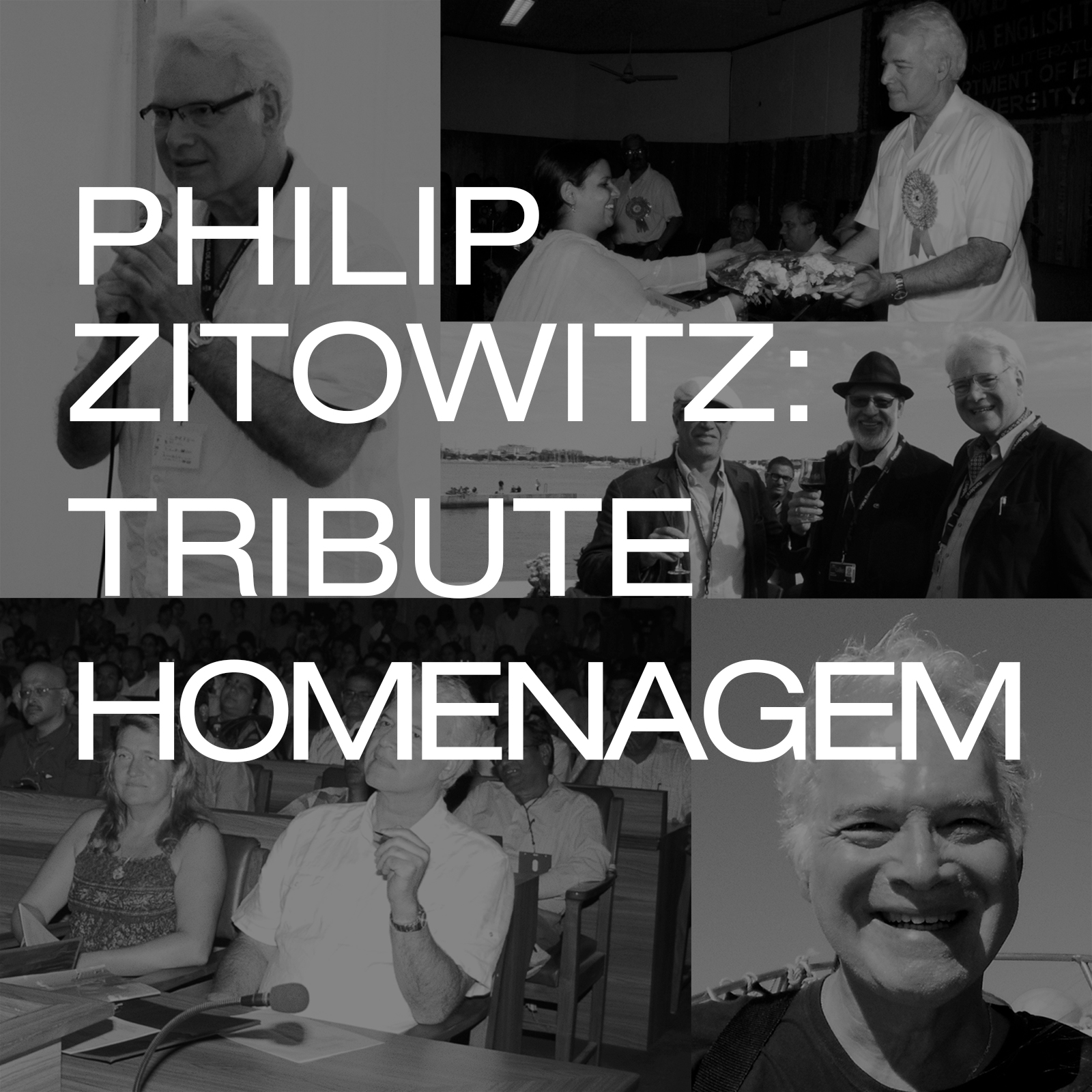
Em julho, em Avanca! Estavas sempre lá!
De ti, guardo a imagem do homem sereno, delicado, extremamente educado, com uma energia fabulosa. O teu olhar, as tuas palavras transmitiam-nos um valor tão especial!
Nas intervenções de Avanca, projetaste sempre a tua energia e a tua vontade de trabalhar connosco. O teu olhar penetrante e sereno, o rigor das tuas palavras ficam na nossa memória!
Recordo a primeira vez que falei contigo. Foi durante um passeio, de moliceiro, contigo e com a Nina. A paixão com que falaste dos teus projetos, do teu trabalho, dos teus alunos!
Recordo o orgulho que senti quando elogiaste o meu artigo e me pediste para assumir em permanência a crítica cinematográfica do International Journal of Cinema. Recordo todas as vezes que trocámos ideias sobre a revista, todas as vezes que me desafiaste e perguntaste a minha opinião.
Lembras-te dos desafios que me colocaste acerca da revista, a última vez que falámos? Vou seguir as tuas sugestões, vou tentar cumprir o que me pediste, mas quero dizer-te uma coisa:
A magia do cinema que te habitou, a força do ensino que projetaste, os grandes planos que nos ofereceste na tela de Avanca não acabaram.
Porque é que apagaste a luz do projetor? Porque é que a tua sessão de cinema acabou tão cedo? Estávamos todos na sala, todos, para te ver, para ver a tua metragem que desejávamos que fosse bem longa…
Deixaste a tela branca e vazia. E é um branco tão difícil e tão diferente daquele branco da roupa que vestias, em Avanca, em julho…
Era em julho, em Avanca, que costumava falar contigo. E a última vez que te vi foi em agosto. E foi muito triste!
Anabela Oliveira
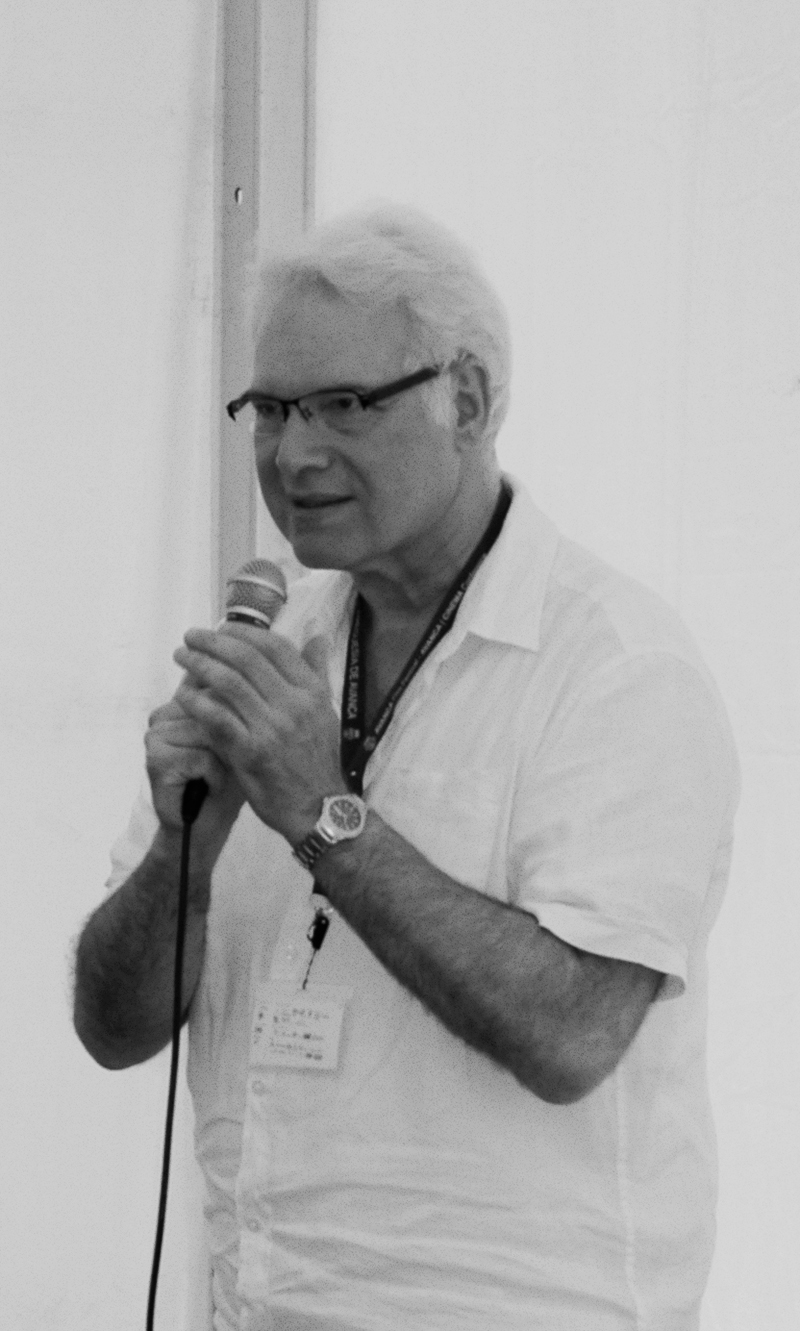
O Philip irrompeu nas nossas vidas com toda a sua elegância, generosidade e curiosidade. Entrou para ficar, injetando em nós e no AVANCA uma energia positiva, como poucos sabem fazê-lo.
“15h de Portugal são quantas no Japão?” Àquela ou noutra hora compatível para todos nós, lá entrávamos em contacto para uma sessão de brainstorming, daqueles pensamentos por vezes utópicos que nos transportavam para um mundo ideal, em que tudo era possível, em que os sonhos se realizavam e o cinema acontecia... mas era também naquelas sessões que algo bem real surgia entre nós. A amizade, certamente, e a preparação minuciosa dos projetos comuns. O festival e a conferência de Avanca, o IJC, o CosmoFest, todos eram convocados para conversas de horas a fio. Às vezes, em Portugal sentia-se o stress da aproximação dos eventos, mas o Philip nunca abdicava da sua calma filosófica, nem do seu sorriso, nem de um certo grau de relativismo. Era sempre, sempre mesmo, compreensivo e profundamente humano nas suas relações.
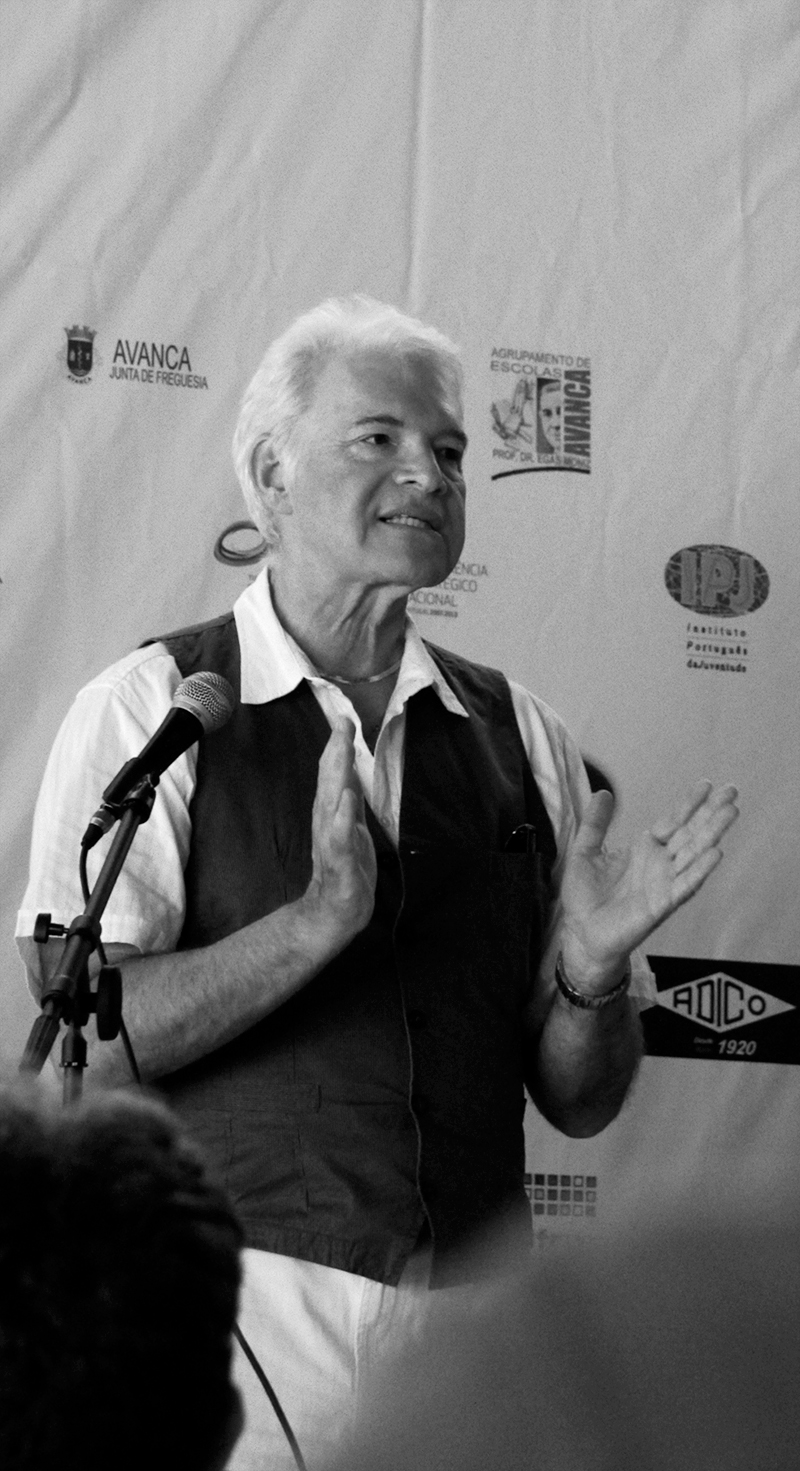
Uma ou duas vezes por ano, os nossos encontros passavam a ser presenciais. O Philip chegava a este país que amava e queria conhecer todos os detalhes da vida de cá, de como se dizia e fazia por cá, de como a gente de cá pensava. Muitas vezes, as conversas partiam da organização concreta de eventos e do cinema, para algo bem maior. Era um homem reto, delicado (nunca lhe conhecemos um tom de voz mais alto nem qualquer palavra descabida) e belo, cuja humanidade fazia com que chegasse a todos, tocasse cada um de nós. Preocupava-se com cada um e com o mundo inteiro.
E depois houve aquele gesto, tão terrivelmente definitivo, tão dramaticamente inesperado, tão inexplicado e desestabilizador. O IJC ficou manco, mas nós sentimos a amizade amputada de um pedaço que nunca mais iríamos recuperar e cuja dimensão eu nem sequer tinha medido bem até lá! Tu partiste e eu pensei que deveria ter aproveitado mais, muito mais, essa nossa amizade. A nossa condição humana tem destas aberrações: nós de facto aprendemos muito de nós próprios nos momentos mais duros. Aquele terá sido certamente um dos mais difíceis.
Mesmo assim, as principais recordações que guardo do tempo que passámos contigo são felizes, joviais por vezes, divertidas outras vezes e, sobretudo, de grande incentivo. Aquela tua energia não nos deixou e é com ela que avançámos e avançaremos. No que me toca, espero ter a honra de encontrar pelo caminho muitos Philips, apesar de saber que és insubstituível. Muitos Philips, ou mesmo só alguns, seriam certamente uma lufada de ar fresco para nós, teus amigos, e para o IJC, teu projeto. Por isso, vamos a isso, vamos lá procurar esses Philips, pelo mundo fora, em honra a ti, à amizade e à vida digna!
Claudia Ferreira
I met Prof. Philip Zitowitz for the first time at the first AVANCA | CINEMA conference, in 2010, of which he was one of the founders. The way he conducted his lectures and conference sessions was always vibrant, provoking interesting debates on the topics covered. His activities and initiatives were diverse and caused positive impacts among his peers, including me, and allow a great interaction between academics and professionals in the field of performing and visual arts. The news about his passing let all his colleagues very sad and who knew Prof. Philip feel the missing of his energy and the joy that he performed his works.
Joao Victor Boechat Gomide
Phil often compared himself to a big wall
With his strong, tall body, topped with his crown of silver
Phil looked indeed so solid, so robust, so trustworthy...
Phil was the wall on which you could lean to rest
Phil was the wall which could protect you, bring you shelter
Phil was the wall you would never imagine going down
But as thunder in our hearts the wall collapsed, crumbled down
Leaving us in the rubble and dust of his big, generous and wonderful mind...
Marc Rigaudis
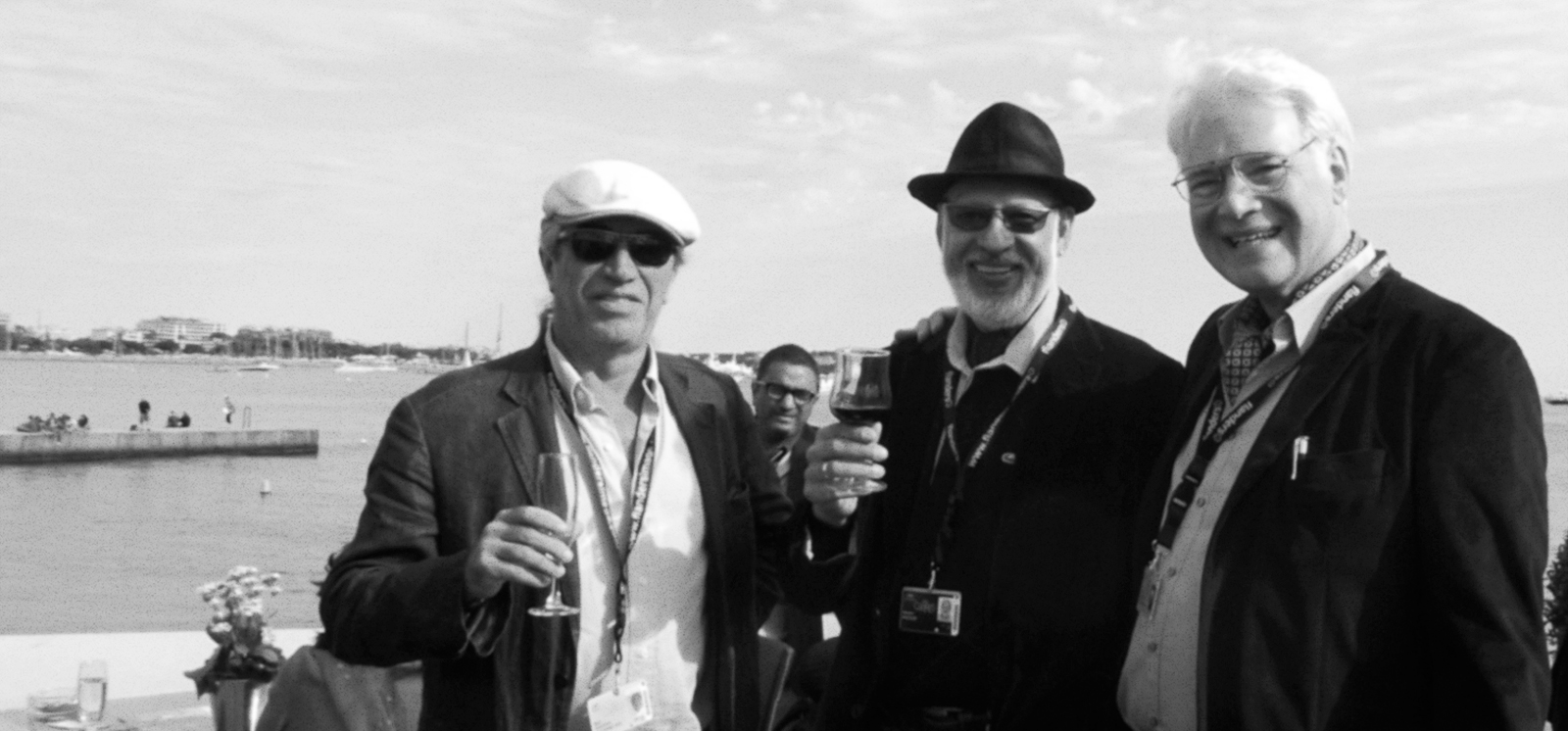
Phil Zitowitz. Ah, yes. I remember him well. It is difficult for me to imagine not having a conversation on the phone with him or sharing a bottle of wine at an overly priced restaurant. Phil was highly creative, artistic and resourceful. He was also a genius as a business person. As an educator he was totally dedicated to the students and willing to help them progress even after they had graduated from MU.
When I first heard the news from Kevin Mark I was in shock for about three days. At one point when I was working on the final touches of the app version of A Christmas Carol, I started crying. Phil gave me the final critique before I put the app up for sale in the Apple Store. Even during his busy schedule he made time for me.
During the summer of 2014 shortly before his death I sent him two emails. He asked me to download photos of the second film festival I had taken at his request. He gave me the option to wait until he returned in September. I said I would wait until he got back from Portugal. Well, how was I to know that fate would step in. Phil never returned to Japan.
So many memories of him remain inside my heart and mind. His good work will continue in the efforts and works of the students he had taught and inspired.
Good Bye, old friend.
Kermit Carvel
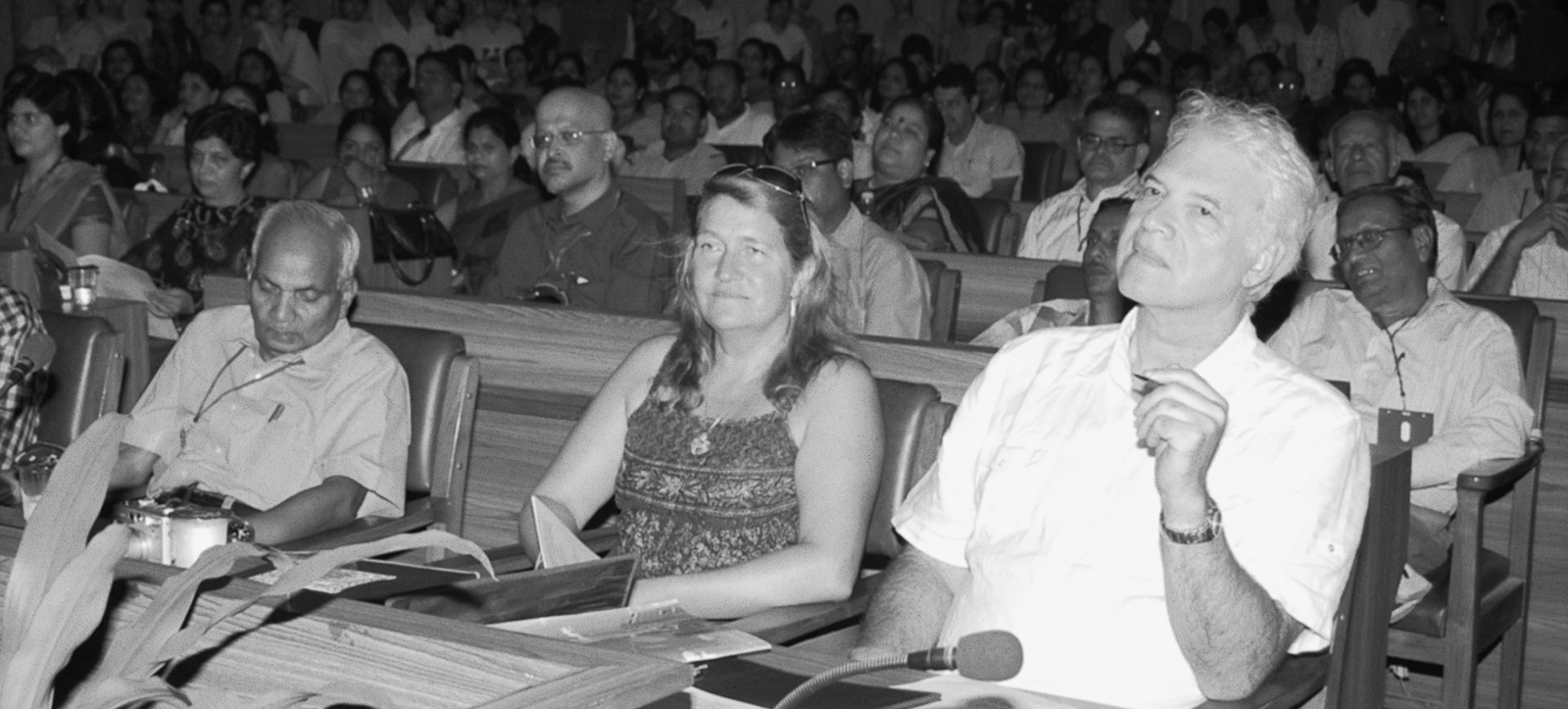
Recusei-me durante muito tempo a escrever este texto, pois este não deveria ser escrito.
Adiei e adiei, não conseguia e não consigo encontrar palavras que façam a justa homenagem que mereces de minha parte, mas exigi de mim e procurei honrar-te de maneira simples, mas genuína.
Sabes que não acredito em anjos, mas acredito em ti. Passam muitos dias em que não te recordo, mas naqueles momentos chave tu surges. Surges para dizer que consigo, que acreditas em mim. Num grande momento, tu vais estar na primeira fila a bater palmas, a sorrir, cheio de orgulho em mim a dizer “A minha Rita” pois eu sou a tua Rita e tu és o meu Philip.
Ainda me lembro da primeira vez que te conheci em Avanca… Eras enorme, americano, professor no Japão e judeu, tudo combinado era muito para mim, que me senti intimidada… pouco depois já nos olhávamos nos olhos, tu sabias como o fazer, chegar às pessoas para ti era simples, era tão natural… e não tinhas que te baixar!
Os braços abertos e o teu coração franco e generoso recebiam, atraiam as pessoas, todos se encantavam contigo.
Genuinamente eras um bom homem, um bom amigo, um excelente profissional e um apaixonado pela vida e pelas pessoas.
Eras grande em tudo, tudo em ti apoiava-me. Trabalhamos com grande seriedade nos projetos que tínhamos juntos, longas conversas e discussões com o objetivo de melhorar. O que eu aprendi contigo! Obrigada.
Tu és o meu Philip e eu sou a tua Rita!
O mundo foi o teu palco e tu brilhaste, meu Philip! Era impossível ficar indiferente pois tu eras diferente! Um corpo de gigante, um rosto de sábio e aquele sorriso de menino.
Adorava cozinhar para ti, sabias?! Ver- te comer?... uma delícia! Bebermos o nosso vinho, chatear a Maria pois queríamos beber e comer mais! Parecíamos duas crianças traquinas!
Tão bom, tão simples! Que maravilha recordar estes momentos, fomos tão felizes!
Eu sou a tua Rita e tu és o meu Philip!
Estava em Rimini quando recebi aquela mensagem perturbadora, na agenda do dia estava a visita ao túmulo do Federico Fellini. Devia ser uma confusão, uma grande confusão! Impossível, não, não queria acreditar. Não alterei os planos do meu dia, lá fui, o coração apertado. E no monumento La Grande Prua chorei por ti!
Fico então com o nosso Amacord! Uma festa, uma grande festa e nós, duas personagens fellinianas! Tu, o grande Maestro! Iremos fazer os nossos passeios noturnos pelas ruas de Rimini ou Roma, de braço dado, parando nos cafés para beber um copo e falar com as gentes. Da janela a Maria vai gritar: “Que andam a fazer na rua a estas horas?!”. E nós vamos rir e responder a uma só voz: “Só mais um bocadinho, Maria!”
Eu sou a “tua Rita” e tu és o meu Philip!
Rita Capucho
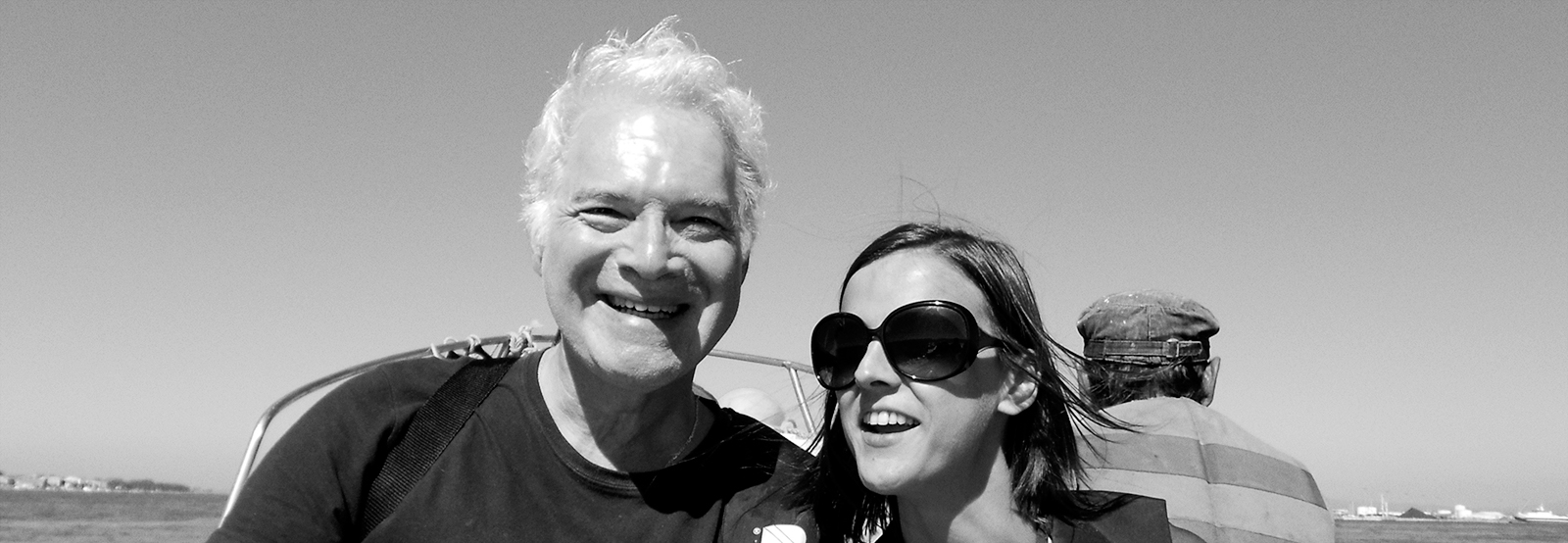
My family was emotionally devastated and shattered on hearing of Philip’s unnatural death. My wife wept and cried “ No, Never. Philip can’t do it.” He was not meant to leave us so early. He was for life because he lived every minute of it. He came to our university twice to attend conferences and endeared himself to all the students and faculty members of our department.with his disarming smile and childlike innocence. His ever-smiling face electrified the gathering the way no body could do. He was the darling of all the delegates and I envied him for this. He could dance with my students for hours together to the beats of Haryanvi Music. Simply wonderful! Such a volcano of energy he was!
Philip could not attend our last conference and every student, faculty member and delegate had only one question to ask me, “ Where is Philip? Where is Philip?” He came from a distant country and became one of us.
I will not blame God for Philip’s untimely departure from the earth because He also must have missed his company.
I can only say, “ He was a man in every sense of the word.”
May God grant peace to the departed soul.
S. P. S. Dahiya
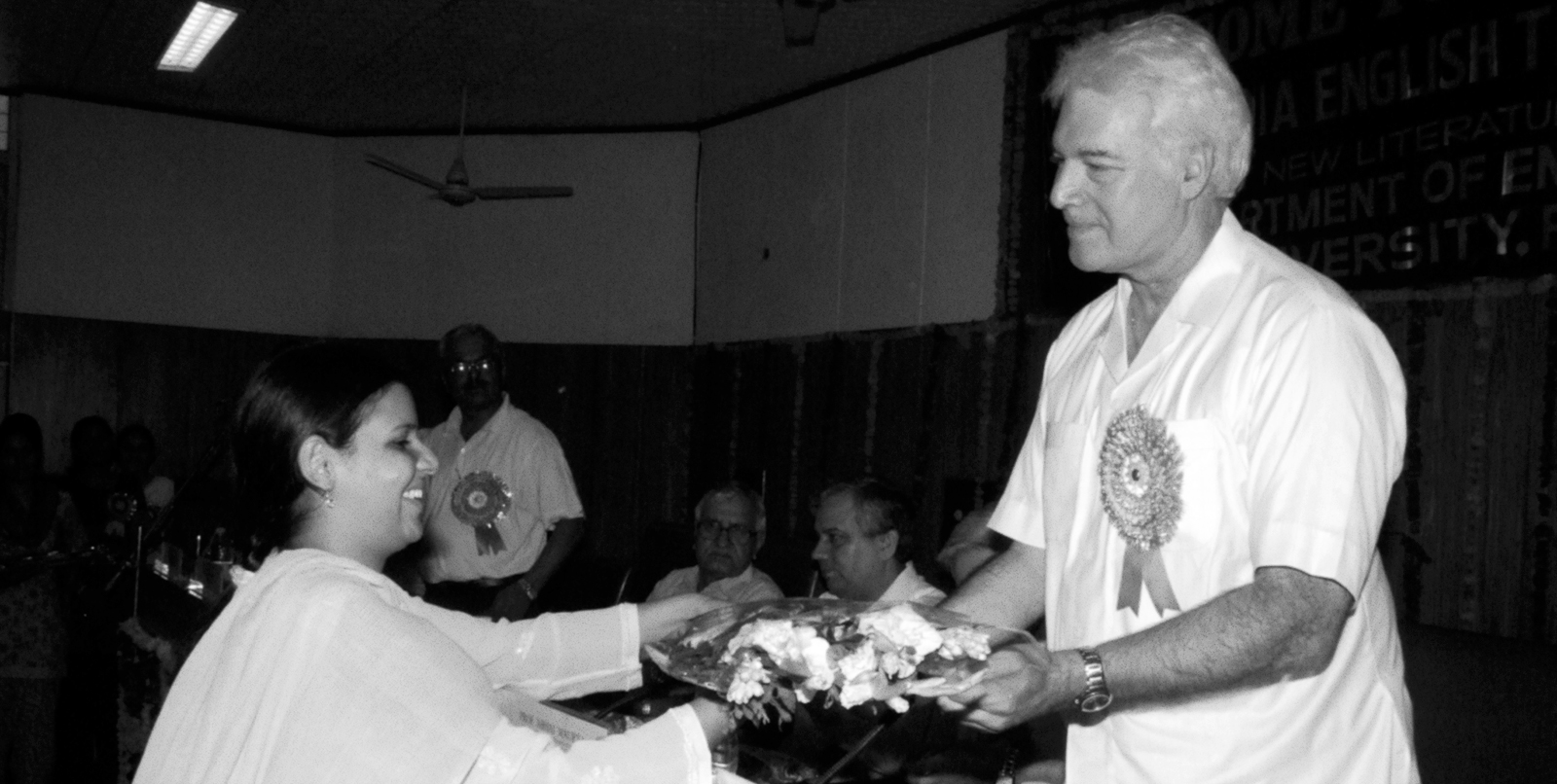
The Tremendous Contributions to Japan by Professor Philip Zitowitz
Philip David Zitowitz was many things: a director and a producer of musicals, plays and films, the author of numerous books and articles, a scholar of great prominence, a lecturer and supervisor to many students in the School of Political Science and Economics at Meiji University, and above all, a loved and respected friend and colleague to many around the world.
Before Philip Zitowitz came to Japan, he had achieved acclaim across the world. He was a Phi Beta Kappa Commonwealth Scholar at the University of Massachusetts, a ‘Shubert Fellow’ at New York University’s Doctoral Program in Performance Studies, a director of Cultural Programs at Long Island University, where he was voted ‘Administrator of the Year,’ and an editor of the journal, Westbere Review. He had also been an artistic director of Odyssey Repertory Company, where he directed Maxim Gorki’s The Lower Depths and James Baldwin’s Amen Corner. He continued to teach at Tennessee State University, where he became the managing director of Gospel Arts Productions, and produced and directed the Gospel Musical, You Gotta Believe It. He had worked to promote gospel musical artists to a wider audience, and to develop the use of gospel music through non-traditional media in the performing and visual arts. He had also served as General Secretary of ‘WASLE,’ which is based in India, devoted to the production of journals, books and conferences internationally. This allowed him to tour India in order to provide workshops and lectures on performance.
Coming to Japan, Philip Zitowitz energetically continued his work in various fields including journalism, films, performing arts, and academia. He wrote reviews and interviews for The Japan Times (cf. Zitowitz, 2000), and two books The Spirit of Broadway, The Spirit of America: An Introduction to the Broadway Musical (Zitowitz, 2001) and The Poetry of Film (Zitowitz et al., 2009). In these books, he laid the foundations for the study of film, performing arts, and education. Using his theoretical approach, he lectured in the School of Political Science and Economics at Meiji University. As soon as he started working there, his charming character soon attracted students and colleagues as well (Morimoto, 2000). He organised the Zitowitz Seminar, which invited those who were interested in global culture to explore different cultures through English language films. He mounted productions with his students such as The Lion King, Peter Pan, High School Musical, West Side Story, Evita, and Beatles: The Musical. Since 2011 he and his students have produced the film festival, ‘Cosmo Fest Tokyo’, with the sponsorship of prestigious companies. Thanks to his devotion, this festival has been associated with the Avanca International Film Festival. Overcoming grief and loss, his students successfully held the Cosmo Fest Tokyo in December, 2014 with the theme: In Memory of Our Friend Philip Zitowitz (Cosmo Fest Tokyo, 2014). He was, however, more than a lecturer to students. Many graduates of his seminar often visited him and some of them established the non-profit organisation, ‘Cosmo Fest,’ in Tokyo with him. This genuine interest that Philip Zitowitz had in his students was something that applied to all of his interactions with others. He was also generous and sincere to those who worked with him, treating us all as friends.
But to list Philip Zitowitz’s academic achievements in Japan is to illustrate only a small part of who he was. He served as judge for the ITO-EN OI Ocha International Haiku Contest, as well as Vice Chairman of the Haiku International Association. He was skilled at introducing people to others. Finally, he was about to explore an interdisciplinary field connecting film with English education in Japan.
The last conversation I had with Philip Zitowitz took place on the day before he left for Avanca in late July, 2014. He was discussing the exploration of the new interdisciplinary field, and his plan to realise the idea. He looked very energetic and was looking forward to visiting Avanca Film Festival and the International Conference there. He emailed me after the festival via conference to tell me of the successful closing. This was just a few days before he passed away.
I was fortunate as so many others to have been a colleague of Philip Zitowitz at Meiji University, and to benefit from the full range of his dedication to supporting students, young scholars, and colleagues, and the many opportunities provided to them. Such dedication in turn inspired tremendous loyalty, in the form of numerous tributes and reflections. It is my wish that during the whole conference every member will recall his extraordinary life and the many ways he contributed to us. He taught us that it was not good enough to be the best in your field. He will be greatly missed, but I am comforted by the knowledge that his accomplishments will continue to exemplify the very best in the field of film, performing arts and education.
Yumiko Mizusawa
References
Cosmo Fest Tokyo. (2014). Heart-warming film festival. Retrieved from http://cosmofesttokyo.com/
Morimoto, Y. (2000). Philip Zitowitz sensei [Professor Philip Zitowitz]. Seikei Forum. 12, 53-55.
Zitowitz, P. (2000, October 17). Japan’s pop culture conquers the world. The Japan Times.
Retrieved from: http://www.japantimes.co.jp/culture/2000/10/17/books/book-reviews/japans-pop-culture-conquers-the-world/#.VVfcXDrfc9Y
Zitowitz, P. (2000). The spirit of Broadway, The spirit of America: An introduction to the Broadway musical (E. Saito and T. Uchino, Annotate). Eihosha: Tokyo.
Zitowitz, P., Carvell, K., Matsuura, T., Managa, H., Sohue, M., Suzuki, H., Suzuki, H., and Ooba, K. (eds.) (2008). The poetry of film. Kinseido: Tokyo.